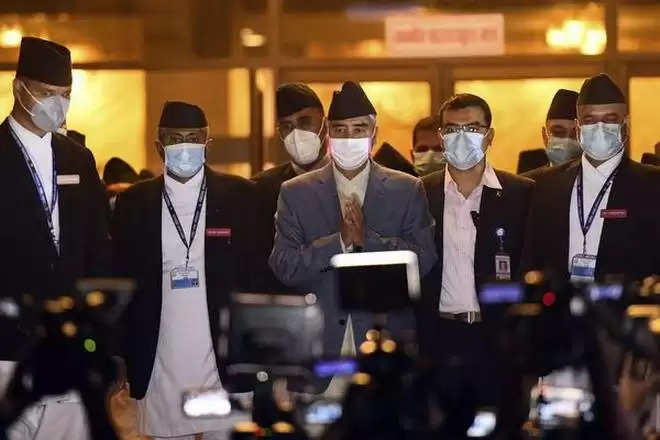Looking forward to working closely with Prime Minister Modi to improve India’s ties: Deuba is Nepal’s Prime Minister.

Sher Bahadur Deuba, Nepal’s new Prime Minister, has expressed his desire to work closely with Prime Minister Narendra Modi to enhance India-Nepal ties.
Sher Bahadur Deuba, Nepal’s new Prime Minister, has stated that he looks forward to working closely with his Indian counterpart Narendra Modi to enhance bilateral connections as well as people-to-people contacts.
After Deuba won a vote of confidence in the restored House of Representatives on Sunday night, Prime Minister Modi promptly thanked him.
Modi remarked in a tweet, “Best wishes for a successful term in office, Prime Minister @DeubaSherbdr. I look forward to working with you to develop our deep-rooted people-to-people relations and further expand our unique collaboration in all areas.”
In response to Prime Minister Modi’s tweet, Deuba expressed his gratitude for his Indian counterpart’s congratulations and indicated his intention to work closely with him to enhance bilateral connections between the two nations.
“Thank you very much for your congratulations, Prime Minister @narendramodi Ji. I am looking forward to working closely with you to improve our nations’ and peoples’ ties.”
Deuba, the 75-year-old President of the Nepali Congress, easily won a trust vote in the newly reestablished lower House of Representatives, averting a general election in the Himalayan nation in the middle of the COVID-19 epidemic.
Deuba received 165 votes in the 275-member House on Sunday after being named Prime Minister under Article 76(5) of the Constitution on July 12 when the Supreme Court intervened.
Deuba needed a total of 136 votes to gain Parliament’s confidence. After being named prime minister, he had one month to seek a vote of confidence. On the first day of the House’s restoration, he requested a vote of confidence in an unexpected move.
Deuba, the 75-year-old President of the Nepali Congress, easily won a trust vote in the newly reestablished lower House of Representatives, averting a general election in the Himalayan nation in the middle of the COVID-19 epidemic.
Deuba received 165 votes in the 275-member House on Sunday after being named Prime Minister under Article 76(5) of the Constitution on July 12 when the Supreme Court intervened.
Deuba needed a total of 136 votes to gain Parliament’s confidence. After being named prime minister, he had one month to seek a vote of confidence. On the first day of the House’s restoration, he requested a vote of confidence in an unexpected move.
Deuba’s failure to win the House’s trust vote would have resulted in the House being dissolved and snap elections taking place within six months in Nepal, which is experiencing an unparalleled health catastrophe as a result of the COVID-19 epidemic.
According to Nepalese media, the outcome of Sunday’s trust vote allows Prime Minister Deuba to stay in office for another year and a half till a new legislative election is in place.
Deuba has previously held the position of Prime Minister four times: from 1995 to 1997, 2001 to 2002, 2004 to 2005, and 2017 to 2018.
On December 20 of last year, President Bhandari dissolved the House of Representatives and called fresh elections on April 30 and May 10 on Prime Minister K P Sharma Oli’s proposal, sparking a power struggle within the ruling Nepal Communist Party (NCP).
The top court restored the disbanded House of Representatives on February 23, dealing a blow to Oli’s plans for hasty elections.
After India completed an 80-kilometer route linking the Lipulekh pass and Dharchula in Uttarakhand on May 8, bilateral ties were strained under Prime Minister Oil.
Nepal objected to the road’s opening, saying it crossed across their borders. Nepal released a revised map a few days later, showing Lipulekh, Kalapani, and Limpiyadhura as its territory. The move elicited a strong response from India.
Nepal’s Parliament approved a new political map of the nation in June, which includes territories that India claims as its own.
.png)